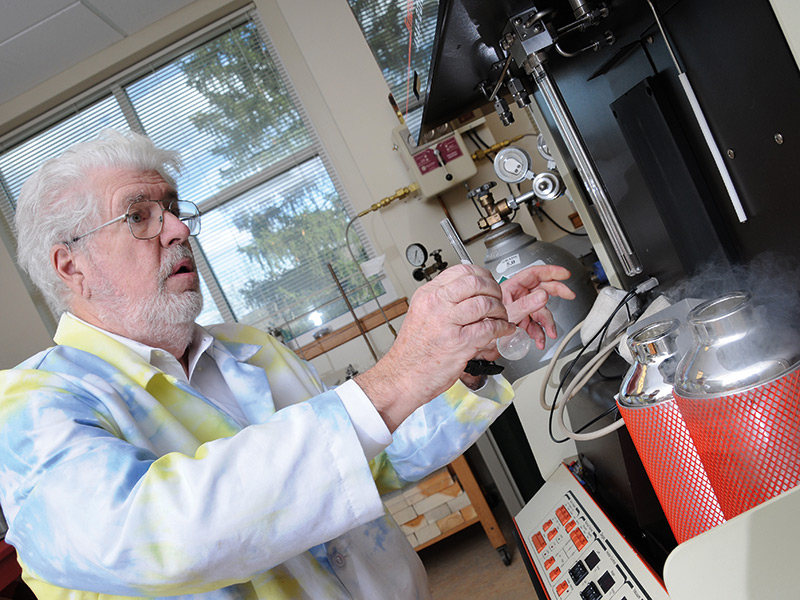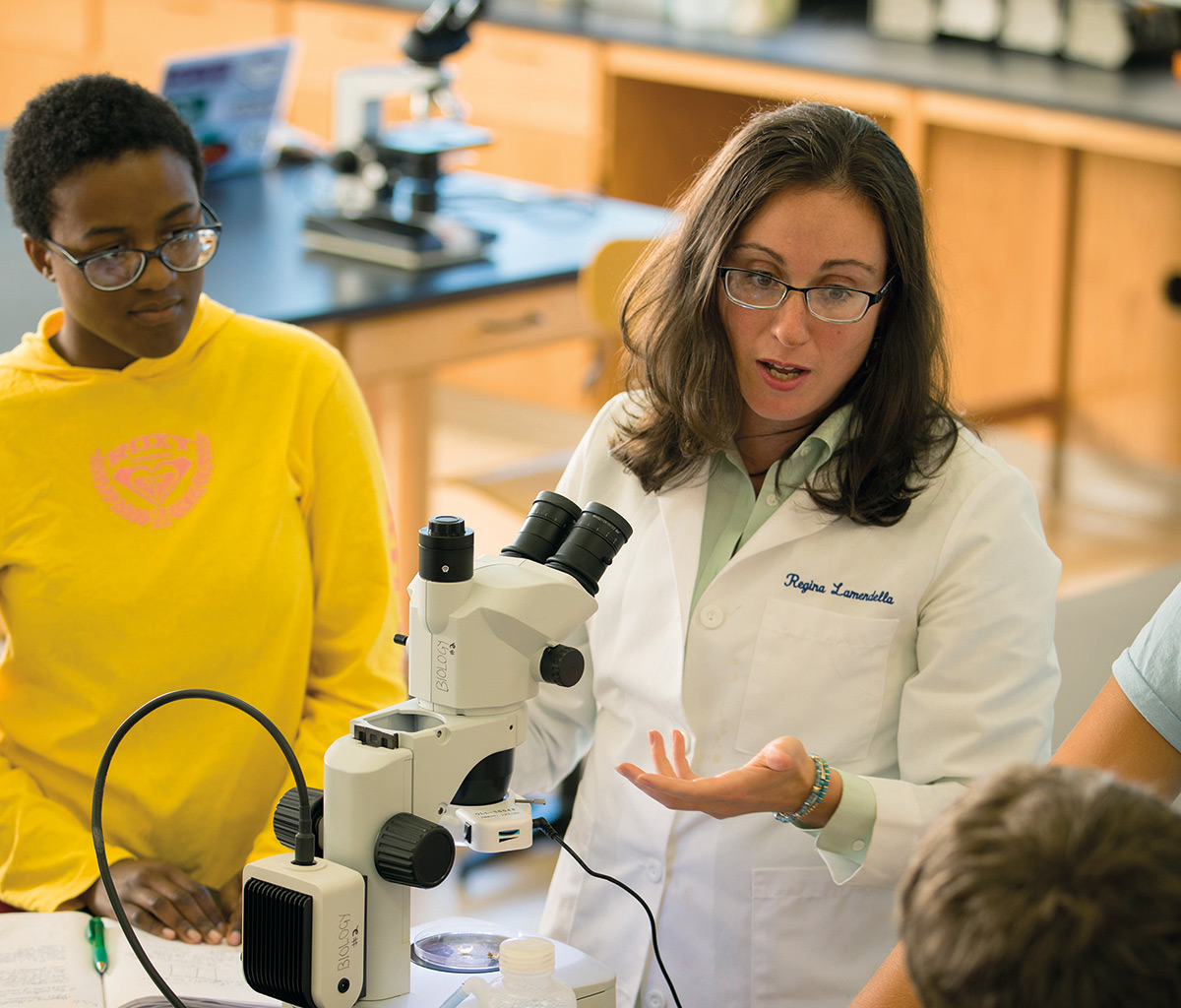Faculty members are integral to academic success for students at any institution of higher education. Juniata College’s faculty partner with their students to position them for not only academic success, but to help develop skills, knowledge, and values for a fulfilling life of meaning and purpose.
Having experienced first-hand the significant impact Juniata’s faculty members have made in the lives of their students, and in turn, the effect graduates have had in their own spheres of influence, initiatives to support faculty members were identified as a key priority during the BELIEVE Campaign.
“My wife and I are both Juniata grads and had the chance to work with a lot of great faculty members,” says George Valko ’75. “The success we’ve had in our careers is a credit to the education we received and the people we’ve met and were educated by. We are both strong believers in education.”
George and his wife, Cindy Hill Valko ’76, who previously created a scholarship to aid students attending Juniata and have been active supporters of Juniata, announced the endowment of the George ’75 and Cynthia ’76 Valko Professorship in Biological Sciences in October 2018.
“At first, we didn’t want our names on it, but we were persuaded that it would be fitting. I myself am a recipient of an endowed professorship and proud to wear that title. I hope someone else would feel the same way,” George says. “Going forward, it’s a legacy to promote educational research, something that makes Juniata the match of any school in the country.”
Endowed professorships provide support for colleges to attract, retain, and reward the highest caliber professors within their respective fields.
“I was hugely honored to be the first recipient of this endowed professorship and in that echelon of professors,” says Regina “Gina” Lamendella, George ’75 and Cynthia ’76 Valko Professor of Biological Sciences. “As a female scientist, imposter syndrome was present early on in my career. When they announced the Valko Professorship, it was a moment I realized my achievements were recognized. It was a big moment for me.”
As a female scientist, imposter syndrome was present early on in my career. When they announced the Valko Professorship, it was a moment I realized my achievements were recognized.
The Valkos were familiar with Gina’s work and impressed by the fact that she chose to continue her teaching and research career at Juniata. Gina has been recognized nationally by the Council of Undergraduate Research as a researcher and as an effective mentor who taps into the unrealized potential of students, bringing out previously unknown strengths and curiosity. Her enthusiasm and love for her work is infectious and results in strong partnerships with her students.
“We’d like to see the professorship continue in perpetuity. We are so proud of Gina and so proud to have her as the first recipient of the professorship. We can’t think of anyone more deserving,” George says. “This supports excellence and education and research at Juniata. We love reading about her work and that of her students.”
The respect and admiration is mutual.
“I’m honored by the support from people of George and Cindy’s caliber,” says Gina. “I’m honored by the investment they’ve made in the professorship to get it started and to endow it as a sustainable position.”
Gina observed that an added benefit for students, outside of expanded research opportunities, is the encouragement for female students hoping to embark on careers in science.
Beyond the support and partnership faculty members at Juniata give freely to their students, faculty members are committed to supporting one another as well.
Paul Schettler, Charles A. Dana Professor of Chemistry Emeritus, shared his sense of camaraderie between Juniata faculty began nearly immediately following his arrival on campus and lasted for the duration of his 50-year tenure. He had been encouraged to travel to Juniata from Ohio for an interview at Juniata by the late Robert Fisher.

“The ease of relationship among the faculty was different at Juniata. Everybody in the chemistry department was friends,” Paul says. “The students interacted easily with the faculty. That’s what made Juniata attractive to me.”
This sense of mutual support inspired Paul to create the Imaginative Educational Initiatives (IEI) grant program.
The purpose of the IEI grant funding is to provide faculty members in any discipline resources to explore new teaching methods and create new courses of experiential opportunities for students. The review process is overseen by the IEI Committee, which is made up of retired faculty members.
“As I was approaching retirement, I looked back over what was funded. Money tends to flow into academics, but not always to teaching. The process of teaching sometimes takes a backseat as we focus on putting together what needs to be taught in an hour or what needs to be taught from the textbook,” Paul says. “That’s what made me decide to focus on money for the process of teaching, looking at what has changed in your field, what is happening currently, and how to improve the technique.”
Wei-Chung Wang, associate professor of business and economics and associate provost for academic initiatives, works closely with the IEI Board.
“Faculty are front-facing in supporting student learning and outcomes,” says Wei-Chung. “IEI funding enhances their ability to do that.”
From the inception, faculty members had the opportunity to apply for IEI grant funding for multi-year projects. Two grants, up to $10,000 each, are awarded each year.
The ease of relationship among the faculty was different at Juniata. Everybody in the chemistry department was friends. The students interacted easily with the faculty. That’s what made Juniata attractive to me.
“This way, faculty members who have ideas would have some predictability for the support they will get,” says Wei-Chung. “The scope of the work can be more extensive than a single-year project.”
Wei-Chung described the IEI grant program as being integral in faculty efforts to pivot to implementing the Hy-Flex instruction model in 2020 and early 2021.
“We were able to provide support to faculty in a new teaching environment and method,” he says. “The IEI grant allowed us to provide immediate support that otherwise we would not have had.”
Through the IEI grant funding, a growing number of research opportunities are also provided for students, which adds to the faculty-student partnership on campus. Schettler’s lifelong commitment to education is central to his motivation for giving.
“I guess my giving comes from a central belief of mine that education is essential to humanity,” Paul says.





